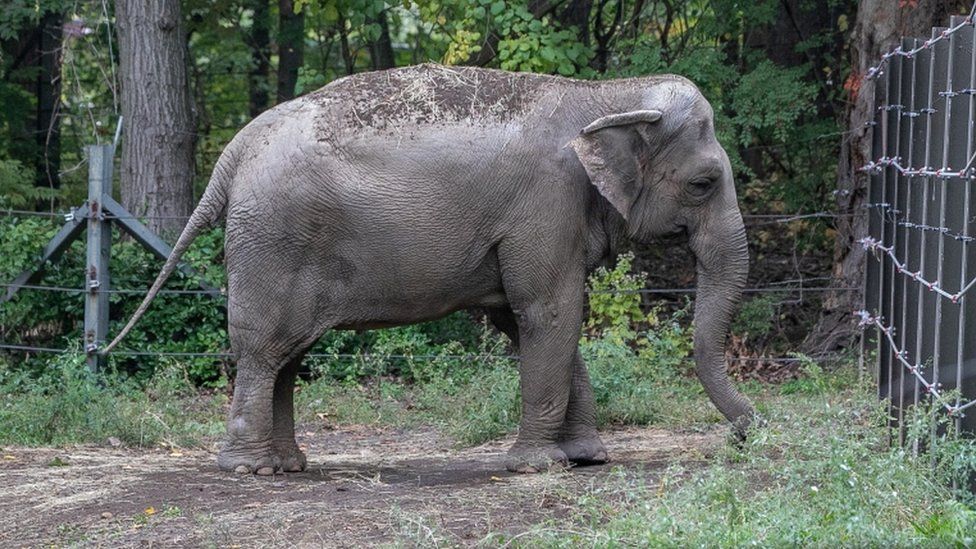Does the Constitution protect an elephant from unlawful detention?
What a bid to free a zoo elephant says about the evolving legal rights of animals
Avery Orrall • January 13, 2024

Happy the elephant at the Bronx Zoo. [Credit: Gigi Glendinning | Reuters]
An elephant stares at the metal fencing of her enclosure — the same barrier she has been contemplating for the past 40 years. And now, she’ll likely be spending the rest of her life in the same Bronx Zoo pen.
The elephant’s name is Happy, and her confinement was up for debate in 2022 when the highest court in New York, the Court of Appeals, took up the case of Nonhuman Rights Project, Inc. v. Breheny. The key question was whether Happy, as a “self-aware, autonomous nonhuman,” has the right to habeas corpus, how lawyers refer to freedom from unlawful detention.
One of Happy’s unlikely allies, Rowan D. Wilson, now chief judge of that court, discussed the case recently in a library at the New York University School of Law, only ten miles away from the Bronx Zoo. Addressing a group of law students, he outlined the reasoning behind his dissenting vote. He was one of two — out of seven judges on the court — to vote for hearing the case.
Wilson thinks it’s only a matter of time before similar cases will succeed. “I would like to come back in 100 years to see where this issue has landed,” he said.
Although he wasn’t certain Happy should be released from the zoo, Wilson believed lawyers had a right to argue in court that she should. But the court majority disagreed, a position Wilson summarized as “human exceptionalism.” Although we grant animals certain rights, such as the right not to be cruelly treated, other rights such as habeas corpus were written with humans in mind, which is why the majority decided it didn’t apply to elephants.
Wilson, however, noted that there is a long tradition of failing to grant full legal rights to humans who were wrongfully detained, including enslaved Africans before the American Civil War and the horrific case of Ota Benga, a person from the Mbuti tribe in the Congo who was placed on display at the Bronx Zoo in 1906.
The fact that Happy and Ota Benga were housed in the same zoo is “fortuitous,” said Wilson, because it makes the point that our conception of who deserves legal protection can evolve over time. The signs of changing attitudes are coming in unexpected places, Wilson noted, including more popular and better-tested vegetarian food and greater interest in wild animals thanks to improved video technology. “Changes like that are going to move society in the direction where animals will be thought of differently,” he predicted.
The court majority also cited a “slippery slope” argument: once we start granting habeas corpus to elephants, where do we draw the line? To this argument, Wilson’s response was blunt: “The slope is going to slip.” If that means that eventually, confinement of animals like chickens is frowned upon, “I don’t care,” he added.
Even now, Happy isn’t the only animal whose confinement is being tested in the courts. The Nonhuman Rights Project, a Washington-based nonprofit, has several other current clients, including Tommy the chimpanzee who is supposedly living in a zoo in Michigan after a violent life in the custody of heavy metal musician Dave Sabo. Two other clients, chimpanzees Hercules and Leo, were moved to a sanctuary in 2015 after they were used in medical testing for six years.
The “only” potent argument, according to Wilson, against courts hearing cases like Happy’s is that the better solution would be for legislatures to pass laws expanding the rights of animals instead of relying on judicial interpretations of existing law. Although the concept of habeas corpus is more than 300 years old and has its roots in English common law, its interpretation has changed as society changes, which is why Wilson believes it will eventually be extended to non-humans too.
The fight may be over for Happy, but Wilson would not be opposed to another petition on behalf of a confined animal being heard by the court. Expanding the legal rights of animals, he says, would not only be good for them, it would also elevate our own ethics. “We make the rules because we have the power to make the rules,” Wilson explained. “The decisions that we make define who we are, too.”